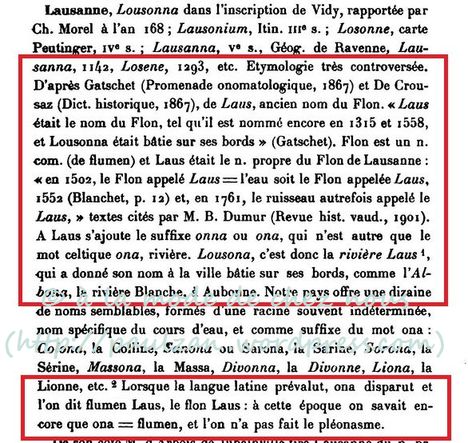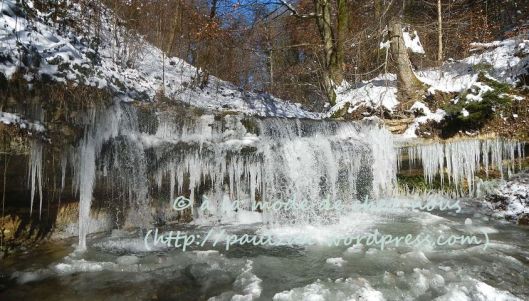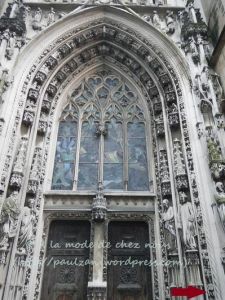 Yesterday, I came across an interesting explanation for the name of the city where I live. According to a book I borrowed from the main municipal library, the name of Lausanne is derived from two Celtic words, Lon, a word associated with the Celtic god Lug, and Sonna, the sun. Unfortunately, the author of Hauts lieux d’énergie en Suisse, Adolphe Landspurg, provides no bibliographic references to back his assertion. This left me pondering the validity of the claim. As I own several books on Lausanne*, I went to the living room and I picked up two books from the shelf I have allocated to my collection of ‘Lausannia’. I read the introductory sections, but I found nothing. Then I tried my luck with the index of one of the books, but there were no entries with the words ‘etymology’, ‘name’ or ‘toponym’. As I did not feel like doing the same exercise again with my other books (I can be a little impatient at times), I decided to resort to search engines.
Yesterday, I came across an interesting explanation for the name of the city where I live. According to a book I borrowed from the main municipal library, the name of Lausanne is derived from two Celtic words, Lon, a word associated with the Celtic god Lug, and Sonna, the sun. Unfortunately, the author of Hauts lieux d’énergie en Suisse, Adolphe Landspurg, provides no bibliographic references to back his assertion. This left me pondering the validity of the claim. As I own several books on Lausanne*, I went to the living room and I picked up two books from the shelf I have allocated to my collection of ‘Lausannia’. I read the introductory sections, but I found nothing. Then I tried my luck with the index of one of the books, but there were no entries with the words ‘etymology’, ‘name’ or ‘toponym’. As I did not feel like doing the same exercise again with my other books (I can be a little impatient at times), I decided to resort to search engines.
 Entry on Lausanne in Henri Jaccard, Essai de toponymie: origine des noms de lieux habités et des lieux dits de la Suisse romande
Entry on Lausanne in Henri Jaccard, Essai de toponymie: origine des noms de lieux habités et des lieux dits de la Suisse romande
This yielded some interesting stuff. In a book on the cathedral of Lausanne (Merveilleuse Notre-Dame de Lausanne: cathédrale bourguignonne**), one author claims that the Latin name of Lousanna derives from Lou, Leu, the Celtic words for raven, a bird associated with Lug, a solar divinity. A book on the toponyms of French-speaking Switzerland published over a century ago (Henri Jaccard, Essai de toponymie: origine des noms de lieux habités et des lieux dits de la Suisse romande) does not include this derivation in this author’s review of the various possible origins for the name of our city. Nevertheless, he mentions a hypothesis that has struck the right chord with me, namely that the name could come from Laus, an alternative name for the river Flon.
 Waterfall near the forest of Sauvabelin, 8 February 2015
Waterfall near the forest of Sauvabelin, 8 February 2015
I simply find this explanation highly attractive because I love the waterfalls that can be found along the river Flon. Moreover, the nicest stretch of the walk that runs along this river lies roughly on the bottom part (on the east, that is) of Sauvabelin, itself a mixture of Latin (sylva, forest) and Celtic (Belen or Belena) words. And to me what is even more interesting is the fact that the latter are the masculine and feminine forms that the Celts used to describe the deity they associated with the light (it owes something to the Greek god Apollo, unlike Lug). From the windows of our flat, there seems to be a perpendicular line that runs from the river Laus (to use its alternative name) to the cathedral, which the author who associates Lausanne with the raven claims that it was a place of worship for the Celts (the early Christians often built churches on former places of worship so as to assimilate the remnants of paganism into the new and victorious religion: Christianity).
 Cathedral of Lausanne, west entrance, 18 Dec 2014
Cathedral of Lausanne, west entrance, 18 Dec 2014
I guess that the next time I find myself in that part of town I’ll have to keep my eyes open for any representations of ravens among the allegorical figures that adorn the west entrance to the cathedral in the light of the author’s conclusion: ‘So Sonna (the sun) associated with Loti reinforces the sacred meaning of this place: Lousonna, raven of the sun, raven of the light, the sign that Lug shines here.’ 😉
* because when I moved here in 2001 I felt that I had to learn a little more about the place, — also because I contemplated the idea of writing about my new home on the web, thus replicating what I had done for my hometown –, so I acquired a small collection of books on the capital of Vaud, on the canton itself as well as on other places within what is also know as le Pays de Vaud.
** various texts collected by Paul Chaudet; this collection of texts on the cathedral is available on a pay-per-view basis on the book section of a famous search engine based in California; of course, I did not pay (why should I when the book is available at no cost in one of the Lausanne libraries?): I simply looked at the tiny excerpts (‘snippets’ in search engine parlance) available for free.
Links
- Walk, walk as much as you can! (an entry about a walk through Sauvabelin and then along the river Flon)
- Geneva-Guide, which was my first foray into the world of digital communication (now defunct, but some archived versions are available here).
